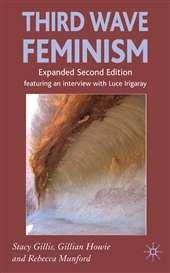Third Wave Feminism: A Critical Exploration

Third Wave Feminism opens with not only a foreword by Imelda Whelehan and introduction by the editors, but with note on the individual essayists included in the book. This design is indicative of the “wave principle” associated with feminism, especially third wave feminism, which emphasizes uniqueness of varying perspectives.
The introduction is just that: a short introduction to feminist theory in general and a brief history of the first, second and third waves. The introduction mentions the “tensions” over who is and who is not a part of the contemporary feminist movement. “The essays collected here explore the possibilities, as well as the limitations, of both third wave feminism and the wave metaphor,” say the editors. The introduction defines the purpose of the book as asking “how and whether another wave contributes to the future of feminism.”
The body of the work is a series of essays and interviews by and with contemporary feminists, many of whom contradict and negate ideas prevalent in second wave feminism, as well as the ideas of one another. This negation and “tension” between the individual essayists are overwhelming. Yet while the contradictions and almost hostile arguments make the book a difficult read, this is exactly the difficulty of the culture of third wave feminism itself. As a person who strives to reconcile ideas and definitions, I was often distracted by my ignorance regarding who to believe and who to “follow.” Again and again, I was reminded that it is almost impossible to define or understand a movement through which you are living. It takes the perspective of time and distance to better understand the nuances and larger picture. I wondered if this book, though a second edition, came much too early?
Part III of the book is called “Politics and Popular Culture.” This was my favorite part of the book. The theory was used as a filter to draw conclusions, and (whew) finally reconcile some ideas on a concrete level. “There is confusion over what it means to be a feminist as well as what it means to be a successful woman,” says Kristyn Gorton in her essay (Un)fashionable Feminists: The Media and Ally McBeal. And in that sentence, the entire truth of the book is stated.
The essays are well written and well chosen. The difficulty of the book is not within the writing, but within the philosophy and theory of third wave feminism, both perhaps exploited too early. I believe the book is successful in achieving its aims, but the book is not for a person who does not have previous knowledge of feminism.
Hey, I have another thought that this book would be useful. But, it turns out to be so expensive if I imported the new one. My thesis should be submitted in two months. I need a favor. Could you copy the book and send to me? Let me know, thanks.